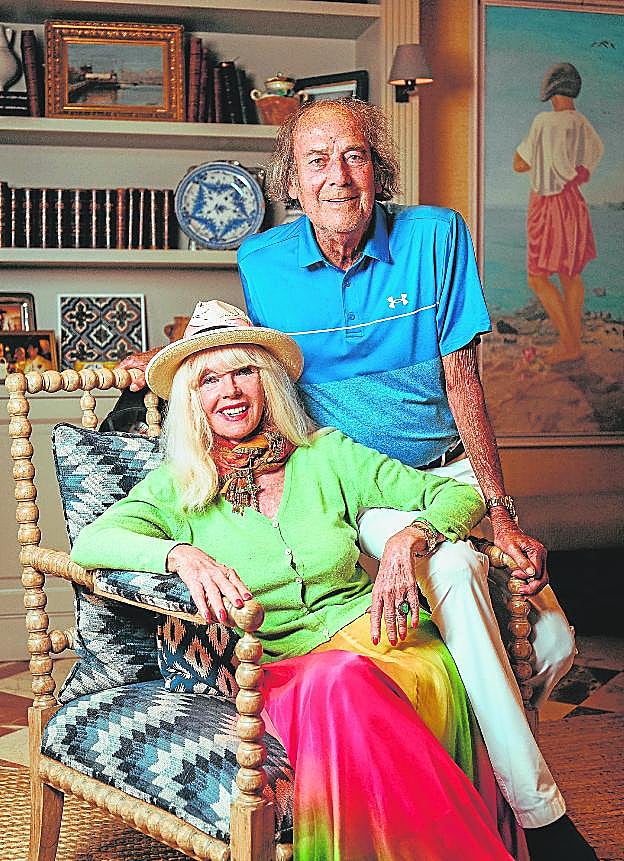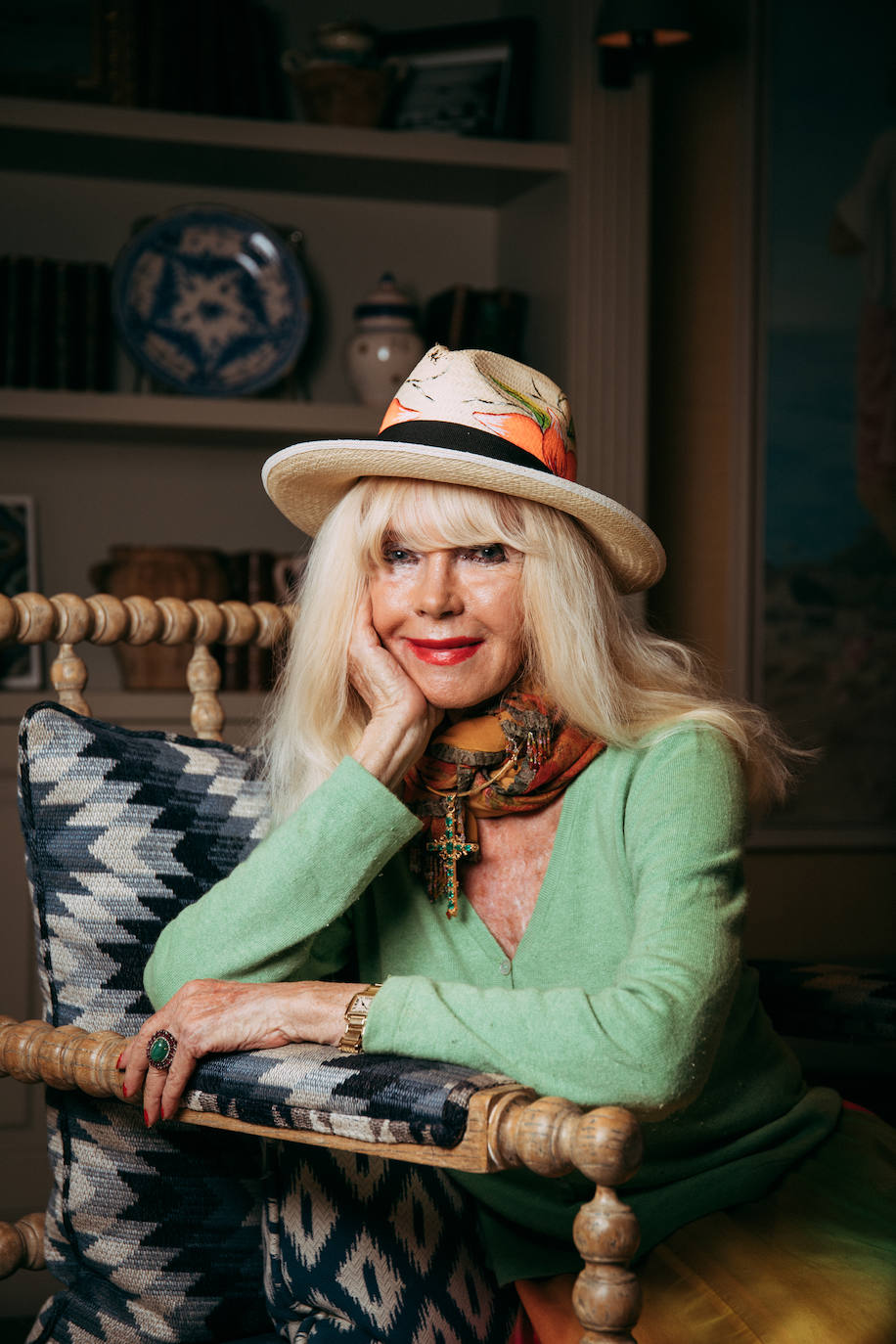
German countess Gunilla von Bismarck, who helped put the Costa del Sol on the map: 'Marbella had more glamour in those days'
If one were to put a face to the golden era of Marbella it would be hers. Now, however, "you come and you don't know anyone," says the leader of the world-famous 'jet set'
Friday, 7 October 2022
If life could be summed up in a handful of photos, those of German countess Gunilla von Bismarck would show all the colour and brilliance of the Marbella of the jet-set in the 1980s, when a group of aristocrats - of whom she was the leader - put the Costa del Sol on the map and filled front covers all over the world.
They would also be a window onto a world which from outside could seem frivolous and superficial. In real life, though, Gunilla is not like that. Cultured, stylish and involved in a multitude of social causes, her love of impossible designs and colour remains to this day. Today, her rainbow-coloured skirt and a hand-painted hat contrast with the sober decoration of the main lounge at the Marbella Club, which preserves intact the legacy of its founder, and her friend, Alfonso de Hohenlohe.
"This is where it all began," she sighs as she makes herself comfortable on the sofa, accompanied by Luis Ortiz, her ex-husband but inseparable companion, the other half of a couple who were always the life and soul of a party.
THE MARBELLA OF TODAY: "We don't go to discotheques now we're 80. Or Puerto Banús: the people are very vulgar"
The unthroned queen of Marbella divides her time between her homes in Istán, Switzerland and Germany, and barely 48 hours have passed since the last celebration, a two-day party to mark Count Rudi's 90th birthday. But now it's time to reminisce and Luis orders a gin and cola with "something to nibble". For Gunilla, mineral water. Another myth debunked: "I never drink," she says.
–Not even champagne at parties?
–Gunilla: Nothing. I don't like it.
–Luis: Well I do. I only use water to clean my teeth and take tablets.
–You're looking well, but we haven't seen you for some time.
–L: We stayed hidden because of the pandemic.
–And have things changed now?
–G: A great deal. People have changed, class has changed...
–L: People have died!
–G: Yes, but if you go to Puerto Banús you see people. The restaurants are full and that is very good. Full of lovely-looking people, but we have nothing to do with them.
–Do you feel that Marbella no longer belongs to you?
–L: It's just that before when you went somewhere you knew everybody, for example at the Marbella Club. Now you come and you don't know anyone.
–Are you very nostalgic?
–G: No, not at all, because we continue at our own pace. We still have a lot of friends who come from Sweden, Germany, France, Italy...and our Spanish friends are still here. They haven't gone anywhere.
–Do you miss those parties in the golden years?
–G: Yes, a little. Those were very elegant parties, very luxurious. Marbella had more glamour in those days. It had a family atmosphere with Count Rudi and Alfonso (Hohenlohe) but it doesn't now. There are new friends, who are fantastic, who live the same sort of life as we did before, but now, as Olivia Valere has also died, we don't go to discotheques any more.
–What was it about Marbella that made it the favourite haunt of the jet set?
-L: We were all living here among people that we knew.
–G: And we became friends.
–And put Marbella on the map.
–G: Well, that was the press, who came here when they found out that Mel Ferrer and Audrey Hepburn had bought a house, that Prince Rainier of Monaco came with his wife... the press asked themselves, why do all those people come here? And then there were more journalists than famous people, but we always got on well with them.
–Jaime de Mora, Alfonso de Hohenlohe, Adnan Khashoggi, Count Rudi... That was another league. If we were talking about football, it would be the Champions.
–L: Yes. You would come down to the beach, see two or three people and in an instant your whole summer was organised.
–Is it true that for your wedding Jaime de Mora gave you some fake drawings by Goya as a gift?
–G: Yes, it's true! And he did the same with a lot of people. He gave us some drawings and told us they were authentic, but I immediately investigated and they weren't.
–Where are they now?
–G: We threw them away.
–Were the jet set parties as crazy as people say they were?
–L: They were all perfectly normal. No drugs on the tables or anything like that, not at all, that is a complete lie.
–G: (Looking at Luis) Not on the tables, no, but obviously there were. There were loads of drugs! I was the only one who didn't take them, because I thought they were too dangerous and too crazy. And I was just drinking water, I'm very boring, I know. And the older I get, the more so.
–L: Don't let her tell you lies, she is great fun. I call her the neckbreaker.
–G: (Kicking Luis on the leg). Don't interrupt me! I do have one talent, which is opening up to people. I approach them because people interest me, and that is an ability that, for example, my son Francisco says he doesn't have. He has others and he is fantastic just as he is. He doesn't need to be like his mother, or his father, who ended up roaring with laughter at Régines nightclub with a Chinese man we had never seen before. Luis doesn't speak much English and the Chinese man didn't know a world of Spanish, but they got on like a house on fire.
Famous people today
–Has the concept of celebrity been devalued, do you think?
–G: There are no great stars nowadays. I don't know who the celebrities are today, so they can't be that famous.
–They're known as influencers today.
–G: That is something I don't understand and I don't want anything to do with it. I love nature, fun people, songs, music, animals and people who try to change the world, especially the era we are living in, which is horrible. So for me an influencer is not a profession, it's a joke.
–Do you think Marbella paid too high a price for constant exposure and the excesses of that golden period?
–L: No, it hasn't paid any price at all because Marbella has become an incredible town and before it was just a seaside resort. Don't forget that now it has 150,000 voters or more.
–That's what I was thinking of, the politics and the times of Jesús Gil.
–L: Gil came here because of the socialists, because they were going to sink Marbella. And they couldn't, because among other things, he arrived. What he did or didn't do is another matter.
–Do you consider him responsible, then?
–L: Well, he made Marbella global and vulgar. He wanted everyone to come so he could sell them an apartment. He wasn't even satisfied with that. He wanted to go into Gibraltar, to Morocco...everywhere. I told him, "just be content with being mayor". But no. He made one son the mayor of Estepona, another the mayor of Ceuta. He used to say he would put an end to ETA and conquer Gibraltar again.
–Was he the first populist?
–G: Exactly. But anyway, to return to your question of the jet set, Marbella is a very important place today. We have the best hospitals, the best doctors, the best hotels, services... the standard has risen a great deal, because a town can't survive on summer parties alone. Here, people work 12 months of the year.
–Maybe now the parties are just less public?
–G: Yes, absolutely. Now we meet in a restaurant or beach bar, or in someone's home. At the age of 80, we don't go to discotheques any more and I don't like the music they play anyway, or the people. I don't like the way they dress. That's why I don't go to Puerto Banús nowadays. The people are very vulgar and very strange.

Zoom

"We're not pretentious"
–Before coming here I looked at the opinions of some journalists at the time and they all seemed to like you both.
–L: We're aware of that. We have a lot of journalist friends and we have never had any problems with them. Normally we would have a dinner for them in the summer. Some weren't easy to win over, though.
–G: We're not pretentious, you see. We don't try to be anything we're not. We're normal.
–You are the daughter and grand-daughter of princes and chancellor Otto von Bismarck was your great-grandfather. Has everything always been easy for you?
–G: Yes, but because of my character, not because of them. I have always understood the people who attacked me. It is clear that things have been easier for me than for some.
–What did they attack you about?
–G: The way I lived, my clothes, because I didn't take life seriously, but I don't go to a party to cry, I go to laugh and make other people happy. The rest goes on inside.
–What makes you cry?
–G: The state of the world, which worries me a great deal. I have a son and two grandchildren and I don't know how they are going to survive. We have lived a good life, but them....?
–You speak seven languages and studied Political Sciences in Paris. That should silence your critics.
–G: I believe those who attack me are jealous. They don't know my background, but the key is in the education my parents gave me, knowing how to behave with people.
–Going back to parties, you held one to celebrate your '50 years of love' this summer. But aren't you divorced?
–L: We celebrated 50 years as boyfriend and girlfriend.
–G: Yes, that's it, because we are divorced.
–L: But we have never been apart.
–And what are you like as grandparents?
–G: I'm stricter. I don't like bad manners, and tell my grandson off if he interrupts me when I'm speaking to someone. I was strict with my son, too, and he is a fantastic person.
–He has never been a problem?
–G: Never. He doesn't drink, smoke or take drugs. And he does sport.
–Like his mother then?
–G: Yes, and Luis has done all those for both of us.
–L: I've done them for everybody!
–G: And your health, what's that like? (To Luis).
–L: They are looking after me very well at the Costa del Sol Hospital. It's fantastic.
–You don't have private health insurance?
–L: Yes, but they are treating me for prostate cancer on the health service. And if I had had to pay for it I would have died. They never fail you, and they are so kind and sweet. The nurses and the doctors. I go for dialysis on Tuesdays and Saturdays, and it's fabulous. I do know how lucky I am.
–G: Yes, you are, because you met me, isn't that right?
–L: You, you got your hooks into me, that's what you did!